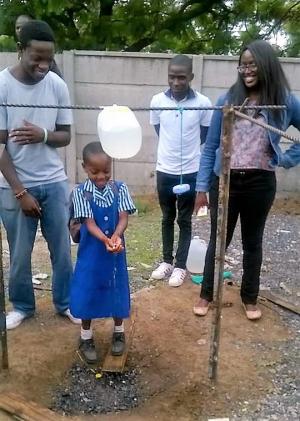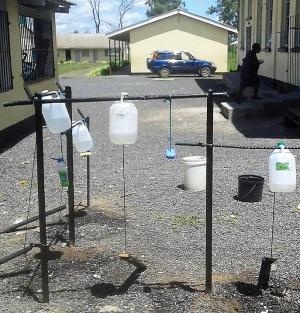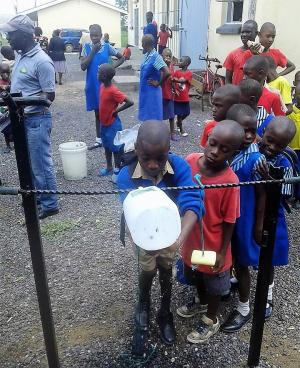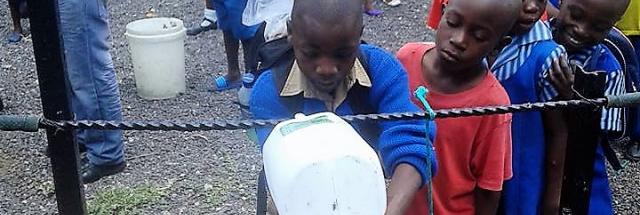The Tippy Tap – a simple innovation from India to Zimbabwe
 Victor Nyanhete, IofC/MRA Zimbabwe youth programme coordinator completed an internship at Asia Plateau, IofC India’s centre in 2015. Just down the hill from the conference buildings in Panchgani is Grampari, the rural and ecological centre. As part of his training at Grampari, Victor was introduced to the Tippy Tap. Grampari promote this simple device, along with a cheerful hand-washing song, in schools around the area, as part of their health and hygiene programme. Victor knew this was an idea that was needed in his home country, Zimbabwe.
Victor Nyanhete, IofC/MRA Zimbabwe youth programme coordinator completed an internship at Asia Plateau, IofC India’s centre in 2015. Just down the hill from the conference buildings in Panchgani is Grampari, the rural and ecological centre. As part of his training at Grampari, Victor was introduced to the Tippy Tap. Grampari promote this simple device, along with a cheerful hand-washing song, in schools around the area, as part of their health and hygiene programme. Victor knew this was an idea that was needed in his home country, Zimbabwe.
Tippy Tap ( http://www.tippytap.org) is a hands-free way to wash hands that is especially appropriate for areas where water is scarce. It is made from a plastic water container, three bars of metal, a bar of soap and some string, and operated by a foot lever made from wood and so reduces the chance for bacteria transmission as the user touches only the soap.
Safe drinking water and sanitation are essential to well-being. Regrettably, Zimbabwe has faced a deterioration in water, sanitation and hygiene services and the washing of hands has been cited as one of the risk factors to epidemics. Cholera besieged the country in 2008 and Zimbabwe’s Health Ministry said 2,300 suspected cases of typhoid have been recorded nationally 2016 and already 12 people have died since last year.
 As part of IofC/MRA Zimbabwe’s youth programme, an element of their community outreach is giving support to Jairos Jiri Naran, a school for deaf and mentally challenged children, located in Ascot suburb 5km outside Gweru. The school has around 240 children and operates with scarce resources.
As part of IofC/MRA Zimbabwe’s youth programme, an element of their community outreach is giving support to Jairos Jiri Naran, a school for deaf and mentally challenged children, located in Ascot suburb 5km outside Gweru. The school has around 240 children and operates with scarce resources.
Victor excitedly told his colleagues about the Tippy Tap initiative he came across in India suggesting that they could build one at the school. They approached the Headmaster who granted them the space and the materials to establish the Tippy Taps for the children.
So on 10-12 January 2017, 15 of IofC/MRA’s youth group built four Tippy Tap stations with different heights for the different aged children, at the Jairos Jiri Naran school.
Made from scrap metal and other materials taken from the school, the initiative was cheap to set-up. The young people dug holes, poured concrete in to make the structure stable and then connected the pieces of metal to make the frame for the plastic containers to hang from.
It is an ingenious device that is used around the world to promote hand-washing, good health and hygiene and most importantly to save lives. You can find out how to make a Tippy Tap here (:http://www.tippytap.org/wp-content/uploads/2012/01/English-Manual-final.pdf)
“I enjoyed building the Tippy Taps and putting a smile on the children’s faces. I was also pleased we could help the school. Mr Mashingaidze (the Boarding Master) told us that getting the children to wash their hands at every meal was a challenge so this is a fun way to meet an important need,” commented IofC/MRA youth member, Blessing.
 The group went to conduct a feasibility study of the Taps eight days later to check the effects of the initiative and how it was being maintained, etc. The Boarding Master commented how much the children enjoy washing their hands now and the system looked as it did when it was built, showing signs of care. The Headmaster said to some of the youth, ”
The group went to conduct a feasibility study of the Taps eight days later to check the effects of the initiative and how it was being maintained, etc. The Boarding Master commented how much the children enjoy washing their hands now and the system looked as it did when it was built, showing signs of care. The Headmaster said to some of the youth, ”
“we are very grateful for the great work you have done for our school. It is making a significant difference. Thank you and please, let’s continue working together.”
The youth team are making plans to build another row of Tippy Taps and to colourfully paint the wall behind the taps with the World Health Organisation’s steps to safely washing hands.
IofC/MRA’s youth programme is gaining momentum, energy and people in Zimbabwe. There is a large committed group who meet regularly and has conducted a number of outreach support in their local communities. They have their first youth conference coming up early February in Gweru with over 30 participants expected. The theme will be ‘From group to Team’ as they look to move from informal meetings into a formal programme.
At the core of all IofC’s initiatives is the concept ‘be the change you want to see in the world’ which the Zimbabwean youth are certainly exemplifying.
You can stay in touch with what the youth group are up to on their Facebook page: https://www.facebook.com/iofcmrazim/
Written by Talia Smith


